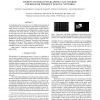Free Online Productivity Tools
i2Speak
i2Symbol
i2OCR
iTex2Img
iWeb2Print
iWeb2Shot
i2Type
iPdf2Split
iPdf2Merge
i2Bopomofo
i2Arabic
i2Style
i2Image
i2PDF
iLatex2Rtf
Sci2ools
ICASSP
2010
IEEE
2010
IEEE
Sparsity-cognizant overlapping co-clustering for behavior inference in social networks
Co-clustering can be viewed as a two-way (bilinear) factorization of a large data matrix into dense/uniform and possibly overlapping submatrix factors (co-clusters). This combinatorially complex problem emerges in several applications, including behavior inference tasks encountered with social networks. Existing co-clustering schemes do not exploit the fact that overlapping factors are often sparse, meaning that their dimension is considerably smaller than that of the data matrix. Based on plaid models which allow for overlapping submatrices, the present paper develops a sparsity-cognizant overlapping co-clustering (SOC) approach. Numerical tests demonstrate the ability of the novel SOC scheme to globally detect multiple overlapping co-clusters, outperforming the original plaid model algorithms which rely on greedy search and ignore sparsity.
ICASSP 2010 | Multiple Overlapping Co-clusters | Plaid Model | Plaid Model Algorithms | Signal Processing |
| Added | 06 Dec 2010 |
| Updated | 06 Dec 2010 |
| Type | Conference |
| Year | 2010 |
| Where | ICASSP |
| Authors | Hao Zhu, Gonzalo Mateos, Georgios B. Giannakis, Nicholas D. Sidiropoulos, Arindam Banerjee |
Comments (0)

